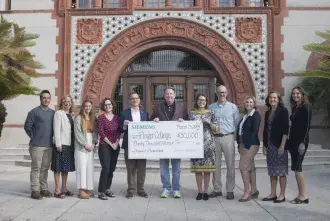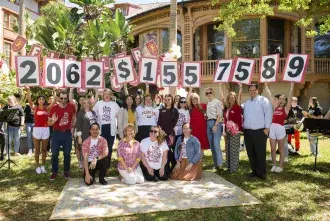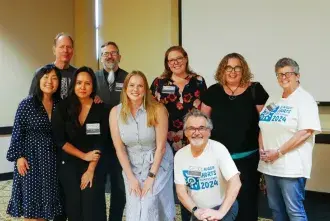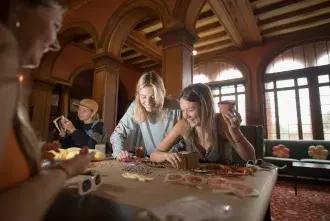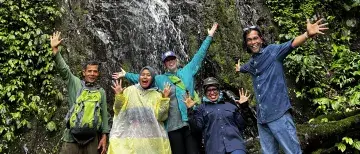
Kreinheder graduated with a degree in Liberal Arts with a concentration in Political Science, Economics, and English in May 2023. She said she was more than a little shocked when she was selected as a Pulitzer Fellow.
“It was right after graduation; I was living in St. Augustine," Kreinheder said, recalling the moment she first found out she was going to be a Pulitzer Fellow. “At that point I was like, alright, I graduated. I'm going back home. I didn't think I was going to get it. So, when I saw the email, I had to read and reread it a million times, and then I called everyone I knew.”
After missing her Flagler community while studying abroad in Germany in the fall of 2022, she asked her advisor, Dean of the School of Liberal Arts and Sciences Rachel Cremona , if she could return to Flagler to finish her senior year. With only one required credit needed to graduate, Kreinheder had time to explore other subjects. Her interest was piqued by the journalism courses offered, including the Pulitzer Center class.
“I emailed Dr. Chapman and Dr. Eaton and asked, ‘Can I take some higher-level journalism classes just for the fun of it? I don't have a major. I just want to give it a go.’ That’s kind of what led me to everything. So I ended up taking the Pulitzer Center class,” Kreinheder said.
Flagler’s Pulitzer Center course is catered toward journalism students interested in pitching a story focused on a global issue with the chance to receive a $3,000 grant to investigate their chosen topic. It wasn’t until March that Kreinheder found her topic. She was writing another story for a different class of hers on coffee culture in St. Augustine when she had a realization:
“I went around to different coffee shops and talked to some baristas, the owners, and people drinking the coffee.” Kreinheder said, “I like coffee myself. I thought to myself, I have no idea what coffee even is. I didn't know coffee came from trees because I was writing about the culture, not the agriculture part of it. So, I looked into coffee more.”
She discovered wild Kopi Luwak coffee production through her research and was fascinated by it.
Kopi Luwak, also known as civet coffee, is made of partially digested coffee cherries, which have been eaten and passed through an Asian palm civet. However, there has been controversy in recent years about the ethics and sustainability of this practice, with claims that the civet’s are not in fact ‘wild’ and are often kept in cages.
She felt she had found her subject, only it had already been covered in a documentary filmed in Bali.
“I realized that the story had already been exposed in 2013.” Kreinheder said. “And then I started reading more and realized that the coffee is produced all over Southeast Asia, but the origins are from Indonesia. I started reading about the PITA investigation, the People's Ethical Treatment for Animals Organization.”
Kreinheder watched the documentary and was appalled. The documentary denounced the entire industry after only visiting three or four farms in Bali, the smallest island in Indonesia and only one part of the country in Southeast Asia. Only part of the story had been told.
After all of this, Kreinheder decided to investigate the production of wild Kopi Luwak coffee in Sumatra, Indonesia, home to two prominent Kopi Luwak coffee farms.
Having never been to Indonesia, Kreinheder would travel for forty hours, over 9,500 miles all by herself, to find out the truth of the existence of wild Kopi Luwak coffee production.
Kreinheder began her research on wild Kopi Luwak in the Gayo Highlands by tirelessly scouring the internet for any information she could find on the industry.
“I cultivated most of my background knowledge of Kopi Luwak through a computer screen but knew that this information had to be put aside once I arrived in Indonesia so I could have an open mind and fresh set of eyes when listening to the Gayo farmers about their stories creating Kopi Luwak.” Kreinheder said.
It was the research she conducted on the ground in Indonesia, connecting with the people there, that truly gave her a window into the coffee production industry and how important it was to the culture of the Gayo Highlands in Sumatra, Indonesia. According to Kreinheder’s research, coffee production accounts for over 80% of the island's economy, so connecting to the people on the island was crucial to her story.
She soon realized that it would be difficult to fully express the richness of the culture she was experiencing through words and images alone.
From hiking through the Damaran Baru jungle with Pak Saleh and Ian Rasyid, Kreinheder was given a peek into their world.
“Physically climbing up the steep jungle holding onto tree branches for leverage, staring into the eyes of a luwak, making coffee with water from a waterfall we came across, these experiences can be told but never felt unless you're there.” Kreinheder continued. “I had the opportunity to really see the work these farmers do through my research, and as difficult as it was, it was the most rewarding and fruitful adventure.”
Kreinheder found herself being invited into the locals' homes, spending entire days with them and eating with their families. She was even invited to a wedding in the village. With the production of Kopi Luwak so heavily connected to the villages she stayed in, she found the farmers were counting on her to tell their side of the story:
“The media outlets have created such a stigma of negative attitudes around Kopi Luwak that I was worried the farmers might not want to talk to me, afraid I’d spin things.” said Kreinheder, “But they were all very forthcoming with everything that they do. They shared a lot of eagerness to tell the story.”
For Kreinheder’s approach to her research shifted.
“It seems like from my perspective that they've been waiting for someone to come.” Kreinheder continued, “I feel I need to do right by them as well as tell the true story.”
But Kreinheder never would have imagined herself in this position when she first joined the Pulitzer Fellow class led by Professor Tracy Eaton. When she first arrived in Indonesia, she was met with adversity– one of her key sources had refused to speak with her due to his personal feelings on America’s politics in the Middle East.
So far away from home, grappling with culture shock, Kreinheder had yet to find her footing. Not sure what to do, she went to Eaton for advice:
“I emailed him right away, ‘What do I do?!’” Kreinheder recalls asking him. “He came back to me and told me, ‘If you are genuine with them and show them who you are, they will, they will begin to trust you. So that really helped.’”
This advice helped Kreinheder settle into her environment and ultimately connect with the locals on a deeper level. In fact, Kreinheder still receives texts from the people she met in Indonesia asking her how she’s doing. While unsure if she’ll pursue a career in investigative journalism, Kreinheder’s connection to the people she encountered ultimately shaped her.
“I think the biggest takeaway was that traveling with a goal to learn something will ultimately make the experience that much more impactful,” Kreinheder said.
